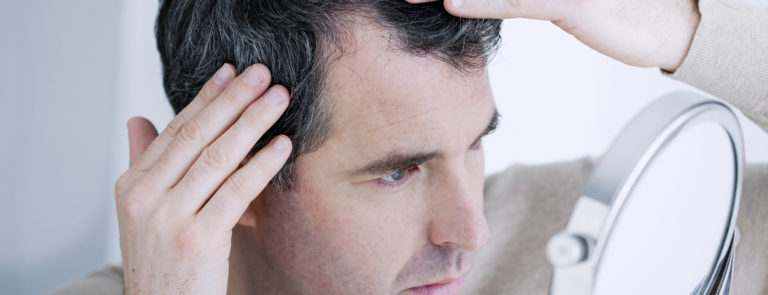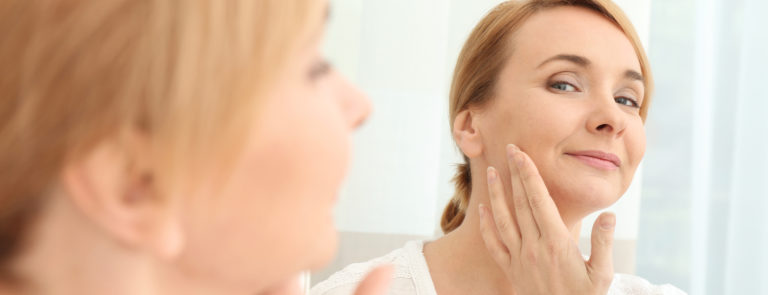15% off €35 OR 20% off €45
Code:CHOOSE
Best treatments to slow down hair loss

In this article, we explore hair loss, focusing on what causes it and some of the best treatments including the vitamins for hair loss. Read the full article…
Hair loss is something that affects both men and women. Generally speaking, we tend to shed between 50 and 100 hairs a day1, either through brushing or washing it, or because of old hair naturally dropping out to make way for new follicles.2
Understanding how our hair grows
In terms of the latter, our hair goes through a natural cycle, which consists of the:- Growth phase – where hair grows for a seven year period.
- Transitional phase – the window between growth and shedding.
- Resting phase – where our hair rests and sheds.
What causes hair to fall out?
Our hair can fall out as part of the natural process mentioned above or it can fall out because of other health and wider factors, including:Hormonal imbalances
Oestrogens (female hormones) are 'hair friendly' and help to keep our hair growing for the optimal length of time. Androgens (male hormones) aren’t very hair friendly, and can shorten the hair growth cycle. Having too many androgens in our body, which can potentially be caused by endocrine disorders, such as Polycystic Ovarian Syndrome, can cause hair to fall out. The extent of this is often down to genetics.4Stress
There are three different types of hair loss that are linked to stress. There’s Telogen Effluvium, which is the second most common type of hair loss seen by dermatologists that can happen to men and women of all ages. Then there’s Alopecia Areata, which is an autoimmune disease that occurs when your immune system attacks your hair follicles. And, finally, there’s Trichotillomania – AKA the ‘hair pulling disorder.’ It involves the urge to pull out the hair from your scalp or other parts of your body. It’s considered an impulse control disorder.5Iron deficiency
According to research, whatever the cause of hair loss for both women and men, having too little iron in the blood makes it worse. Ferritin (that helps our body’s store iron) levels of 10-15 ng/mL are within the ‘normal’ range, with a ferritin level of at least 50 ng/mL required to help replenish hair.6Hypothyroidism and hyperthyroidism
Severe and prolonged hypothyroidism and hyperthyroidism can cause hair to fall out from the entire scalp. Regrowth can be achieved by treating the underlying thyroid disorder, which can take months and isn’t always possible.7Age
Hereditary hair loss caused by getting older is the most common cause of baldness.8 It’s not uncommon for hair to start getting thinner due to genetics and the overall ageing process. Many men and women may start to see mild hair loss in their 30s and 40s.9 As we get older, it’s possible for the diameter of our hair shafts to get narrower over a period of time. In turn, this results in our hair having less volume, which is driven by a change that’s happening deep down in the roots of our hair.10Solutions for supporting hair health
Shampoos for hair loss
Having a dry, flaky scalp can cause hair loss, which is why it’s important you try and keep your scalp as flake-free as possible. If you’re suffering from this, choose shampoos that are designed to clear flaking and itching.11 There are also specific alopecia shampoos for hair loss, as well as caffeine shampoo, which is reportedly said to stimulate hair growth (note – caffeine’s impact on hair growth is a subject of much speculation and debate)12Vitamins for hair loss
There are quite a few supplements and vitamins for normal hair health on the market that are designed to help with hair health, including our hair support range of products. Overall, following a healthy, balanced diet that contains all 13 of the essential vitamins and minerals that our bodies need can help promote hair growth. More specifically, biotin, copper, selenium and zinc are said to be the most essential minerals for hairArgan oil
The oil is believed to have several hair-boosting benefits. This is because it’s full of fatty acids and powerful antioxidants, such as Vitamin E, that have been shown to help with overall scalp and hair health.Coconut oil
Having a well-oiled scalp can potentially help keep hair follicles healthy. Because coconut oil contains lauric acid it helps bind the protein in hair, help protecting the roots and strands and preventing them from breakage. The antioxidants present in coconut oil may help boost hair growth. It also acts as a conditioner, which can potentially aid and maintain hair.13How to apply coconut oil to your hair:14
- Warm a teaspoon of coconut oil up in your hands so that it opens your hair cuticles when applied.
- Part your hair and apply the oil where your hair is the driest (e.g. the ends).
- Leave it on for 20 to 30 minutes. You can leave it on for longer if your hair is really dry, even as long as overnight.
- Rinse it out, using shampoo and conditioner and warm water. You may need to do this a couple of times.
More of the best oils for hair
In addition to coconut oil, essential oils have also been known to aid with helping hair grow and making it strong and shiny. These hair-friendly oils include:15- Lavender can reportedly speed up hair growth. It also boasts antimicrobial and antibacterial properties that can improve scalp health. How to use it: Combine several drops of lavender oil with three tablespoons of olive oil or melted coconut oil and apply it directly to the scalp. Leave it for at least ten minutes before washing it out and shampooing. Repeat several times a week.
- Peppermint – is believed to be able to improve circulation and promote hair growth during the growing phase. How to use it: Mix two drops of peppermint essential oil with the carrier oil of your choice. Massage it into your scalp, leaving it in for five minutes before washing it out with shampoo and conditioner.
- Rosemary – is said to be great for making hair appear thicker, as well as helping it grow, thanks to its positive cell generation-boosting effect. How to use it: Mix several drops of rosemary oil with olive or coconut oil and apply it to your scalp. Leave it in for at least ten minutes before washing it out with shampoo. Repeat twice a week.
- Cedarwood – works by balancing out the oil-producing glands that are present in our scalp. It also has antifungal and antibacterial properties, which can help prevent dandruff. How to use it: Mix a few drops of cedarwood essential oil with two tablespoons of a carrier oil of your choice. Massage it into your scalp and leave it for ten minutes before washing it out.
- Lemongrass - lemongrass oil is an effective dandruff treatment, with one 2015 study finding that it significantly reduced dandruff after just one week. How to use it: Ideally, you want to use it every day for maximum results. Mix a few drops of it into your shampoo or conditioner and then massage the mixture into your scalp.
- Thyme – can help promote hair growth by stimulating the scalp and actively preventing hair loss. Like cedarwood oil, thyme oil has also found to be helpful in treating Alopecia Areata. How to use it: Put two small drops in two tablespoons of a carrier oil before applying it to your scalp. Leave it on for about ten minutes, then wash it out.
- Tea tree – tea tree has powerful cleansing, antibacterial, and antimicrobial properties. When used topically, it can help unblock hair follicles and aid hair growth. It’s commonly used in anti-dandruff treatments. How to use it: Mix ten drops of tea tree essential oil with your shampoo or conditioner and use it every day. Alternatively, you can mix three drops with two tablespoons of a carrier oil and leave it on for 15 minutes before rinsing it out. For more insight on how to combat hair loss, read this article, ‘Thinning hair: What you need to know.’
Sources
1 https://www.nhs.uk/conditions/hair-loss/
2 https://wimpoleclinic.com/blog/facts-and-statistics-about-hair-loss-in-the-uk
3 https://www.independent.co.uk/life-style/hair-growth-cycles-7-years-why-how-manage-changes-shedding-a8385881.html
4 https://www.cosmopolitan.com/uk/beauty-hair/advice/a48958/hair-loss-reasons/
5 https://www.healthline.com/health/stress/stress-hair-loss#types-of-hair-loss
6 https://www.webmd.com/skin-problems-and-treatments/hair-loss/news/20060516/hair-loss-may-be-iron-deficiency#1
7 https://www.btf-thyroid.org/hair-loss-and-thyroid-disorders#:~:text=Severe%20and%20prolonged%20hypothyroidism%20and,months%20and%20may%20be%20incomplete.
8 https://www.mayoclinic.org/diseases-conditions/hair-loss/symptoms-causes/syc-20372926
9 https://www.medicinenet.com/hair_loss/article.htm
10 https://www.marieclaire.co.uk/beauty/hair/best-shampoo-for-hair-loss-2-23295
11 https://www.marieclaire.co.uk/beauty/hair/best-shampoo-for-hair-loss-2-23295
12 https://onlinedoctor.lloydspharmacy.com/uk/hair-loss/what-is-caffeine-shampoo
13 https://food.ndtv.com/beauty/coconut-oil-for-hair-loss-use-this-magic-potion-for-happy-and-healthy-tresses-1867004#:~:text=A%20well%2Doiled%20scalp%20is,help%20boost%20healthy%20hair%20growth.
14 https://www.byrdie.com/how-to-apply-coconut-oil-to-hair
15 https://www.healthline.com/health/essential-oils-for-hair-growth#essential-oils



